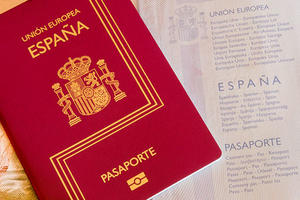What’s a NIE and how can you get one?
The NIE (Número de Identificación de Extranjero) is your foreign identification number. You need this number to sign a rental contract, a work contract and open a bank account.
EU citizens need only apply for a NIE, which is valid for 5 years. If you are a non-EU citizen, you must apply for a TIE (Tarjeta de Identificación de Extranjero) which is your resident card. The TIE is valid initially for one year, but can be renewed for a further five years. When you apply for your TIE card your NIE number will be printed on the front. You do not need to apply for your NIE separately as you get it with your TIE, but if you need to accelerate the process to get your NIE number, you can apply for it beforehand. You can check the documentation needed and the process for getting your TIE on the government website (in Spanish).
The first thing you should do is locate your nearest Oficina de Extranjería and make an appointment. Due to the large waiting list, you may have to wait a month to be seen, which is why it is important that this is the first thing you do. Once you have an appointment date, you need to gather the following documents together (the more documentation you can show, the less likely it is that your application will be rejected, or that you have to come back). It is also recommended that you make photocopies of everything, to save yourself time later on:
- 2 x completed EX14 form (which can be downloaded from the government website )
- Passport
- Passport photos (Non-EU only)
- Social security number
- Empadronamiento (a document that states your current address in Spain)
- Work contract (if you have one)
During your appointment, you will be given another form which you need to fill in and take to the nearest bank in order to pay the fees (usually 10€). Once everything is complete, you will be told when you can return to pick up your card. The documentation is accurate at the time of research (2015).
How to open a bank account

Opening a bank account is a fairly simple process in Spain. There are two types of bank account available for an expat: a non-resident account and a resident account. The former is a good option if you need to open an account immediately and you are still waiting to receive your residency card. The only limitation to this account is that you will not be able to register for a credit card or an overdraft. You can open a resident account once you have your TIE/NIE card.
It is unlikely that you'll need to make an appointment to open your bank account, you'll just need to bring your passport, TIE/NIE and proof of address with you.
When choosing a bank account, you should find out whether they have an online banking service, which you will need to pay rent or make international transfers. You should also find out which ATMs you can use to withdraw money. The main bank networks in Spain are Servired, Telebanco 4B and Euro 6000; it is worth noting that Servired is the most extensive network. You should find out which network your bank belongs to in order to avoid paying commission on your cash withdrawals. If you have a pay-as-you go phone, it's also a good idea to find out whether you can top up your phone from an ATM.
The exchange rates offered to you by your new Spanish bank are likely to be fairly costly too, so if you plan to be making regular bank transfers from one account to another, you may want to look into the various money exchange services available. These are designed to help expats avoid losing large sums of money through poor exchange rates.
Important taxes you need to know about

If you are legally working in Spain, you will need to pay income tax. There are some additional taxes that you should be aware of too:
Road tax
If you are planning to import you car into the country, or buy one once you arrive, you must pay road tax. This is a yearly tax that must be paid at the local City Council by the owner of the vehicle. Make sure you are up to date with your road tax as you will be notified with a surcharge should you not pay the tax in time.
The City Council can even take the amount owed from the owner’s bank account if he fails to make the payment after being notified.
Property tax
If you are planning to buy a property in Spain, you will need to find out the taxes you need to pay. If you own a property in Spain and are living in it on 1st January (of any year) you are liable to pay the local property tax (Impuesto sobre Bienes Inmuebles (IBI)) depending on the region you are living in. This tax applies to both residents and non-residents.
The amount of tax you pay is calculated as follows: the amount of rental value multiplied by a tax rate set by the local government according to that municipality.
Social security number

If you are moving to Spain with the purpose of obtaining work, you will need to get your social security number (número de afiliación de la Seguridad Social). This number is necessary for tax purposes, retirement, sick days and maternity/paternity leave.
You can register for your social security number at any social security office (tesoreria de la seguridad social). You can locate your nearest office here. You will need to bring the following documents:
- Passport or another valid ID with photo
- A photocopy of your ID
- TA-1 form (print it out and bring it to the office filled in)
EU citizens (or family members of a Spanish citizen) only need to present a valid form of ID (i.e. passport) in order to obtain their number. Non-EU citizens often need to present a valid work permit in order to get their number. If you register as autónomo (self-employed) you must pay for your own social security.
The social security documentation is accurate at time of research (2015).
The healthcare system
Once you have your social security number you can benefit from the public health system in Spain. Being part of the social security system means that your employer will cover the necessary fee for you to receive basic health care services.
Prescriptions do not come under the “basic healthcare” umbrella, although the costs are often reduced due to the copayment system which came into action in Spain in June 2012. The idea behind this scheme is that everyone must pay a contribution towards their prescription costs. This is to encourage the responsible usage of medical prescriptions.
Every autonomous region has its own healthcare regulations meaning the quality of care you receive can differ depending on where you live. Unfortunately, due to the large number of people using the public services, overcrowding and long waiting lists are a frequent occurrence.
Many people use private health insurance as a supplement to their free basic coverage to include services such as dental and eye care, which is not free in the public sector. The advantage of the private healthcare system is that insurance companies have their own network of hospitals and clinics so you can avoid the waiting lists.
------------------------------------------------------------------------------------------------------------
This article was submitted by Caser Insurance , a health insurer who specialise in providing plans for expats in Spain. For more detailed information on any of the above, check out their free information service for expats.

